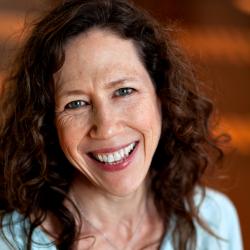What's My Approach to Therapy?
I endeavor to learn as much as I can about the internal landscape-- thoughts, feelings, beliefs, personality, temperament-- of people who come to me for assistance, so that I best meet the unique needs of each individual. I'm LGBTQIA-friendly. I use a two-pronged approach: addressing the issues that underlie the concerns that bring someone to therapy, while teaching skills and tools for handling challenges in a way that is self-supportive and effective.
I'm trained in a number of psychotherapeutic and body-mind approaches that are effective in healing wounds from early in life and traumatic experiences, including:
Certified Internal Family Systems (IFS) Therapist
Developmental Needs Meeting Strategy (DNMS)
Somatic Experiencing
Sensorimotor Psychotherapy
Eye Movement Desensitization and Reprocessing (EMDR)
Dialectical Behavioral Therapy (DBT)
For clients who participate in 12-Step recovery programs, I integrate 12-Step philosophy into the process of therapy.
No two people are alike, so I mix and match to use the combination of approaches, that best fit each individual.
I believe that cultivating self-acceptance and learning mindfulness are fundamental to healing and change.
My Practice & Services
I'm a Certified Eating Disorders Specialist through the International Association of Eating Disorders Professionals (IAEDP), and an IAEDP Approved Supervisor for those seeking certification. I'm a Certified IFS Therapist, and Approved Consultant for therapists and practitioners seeking IFS certification, and I'm starting an IFS therapy group that will meet the second and fourth Fridays of each month beginning May 28, 2021.
I'm trained in treating trauma and post-traumatic stress. I believe that eating disorders and other apparently self-destructive problems develop for a good reason; a means of coping, and managing difficult emotional states; but become life andor health threatening problems. I help people to recognize and strengthen their healthy, authentic selves, and to give them ways to live without their problematic beliefs, attitudes and behaviors.
I'm also a yoga instructor and a Phoenix Rising Yoga Therapy practitioner. for ethical reasons, I don't do yoga therapy with my psychotherapy clients, and vice versa. But my training in each modality informs the other. I completed a Trauma-Sensitive Yoga teacher training program at the Trauma Center at JRI in Boston, MA, and I teach yoga classes for survivors of trauma.I also facilitate "Yoga for Eating and Body Image Concerns" classes.
I am in-network with the Duke University student insurance plan. I file for all other insurances, using out-of-network benefits, and will work with you to make payment arrangements that fit your financial circumstances.
On the Fence About Going to Therapy?
Entering therapy for the first time (or returning to therapy but with a new therapist) can be daunting. If you've never been in therapy, the process can seem mysterious. What good can talking to someone do? How is it different from talking to my friends or family members? I've often heard people say that they have been taught to believe that we should be able to solve our own problems; that leaning on others for help is a sign of weakness. However, I believe that we are wired to be interdependent, that we naturally need support and help from others. There are aspects of ourselves that we can't see, let alone understand, without assistance from someone else. As a friend of mine who is also a therapist says, "You go to therapy because you can't see your own butt!"
A good fit between client and therapist, in terms of personality and style, is essential to successful therapy. Finding the right therapist can be challenging. If you've been in therapy before but are looking for a new therapist, you're likely looking for something just like or very different from what you experienced previously. You may have had a wonderful therapist who moved away, or a therapist who wasn't a great fit. I encourage everyone seeking therapy to call at least three different therapists and "interview" them. See what it feels like to talk with them. Tell them what you're looking for help with, and see if their response indicates that they "get" you. This is an important relationship, so be picky!
How My Own Struggles Made Me a Better Therapist
As a teenager, I struggled with overeating, anxiety, depression and poor self-esteem. I entered therapy for the first time at age 17, against my mother's wishes-- she didn't believe in therapy, and, as she told my therapist, was "raised not to talk about my feelings." In my freshman year at UCLA, stressed,socially anxious and unable to stop overeating, I went to the counseling services available to students. I one session with a psychology student who told me that she thought I needed not therapy, but to see a dietician and to attend an assertiveness-training group. I tried both. I couldn't follow the dietician's advice because I had what I know now to be Binge Eating Disorder, and the assertiveness training group was full. I felt lost and alone.
I limped along for two more years, until I found a self-help program that helped me with my eating issues and gave me connection to a wonderful, supportive community of others who shared my struggles. But I knew I needed more, and I went to see a therapist who was recommended by a friend. Over the years, as I continued in the eating recovery program, I was in and out of therapy. I had such a positive experience that when I decided to give up pursuing a career in acting, I decided I wanted to become a therapist myself.
I believe that my struggles and my experiences as a client contribute tremendously to my skill as a therapist. I still utilize therapy for myself as needed. I believe that a good therapist works on hisher own stuff

